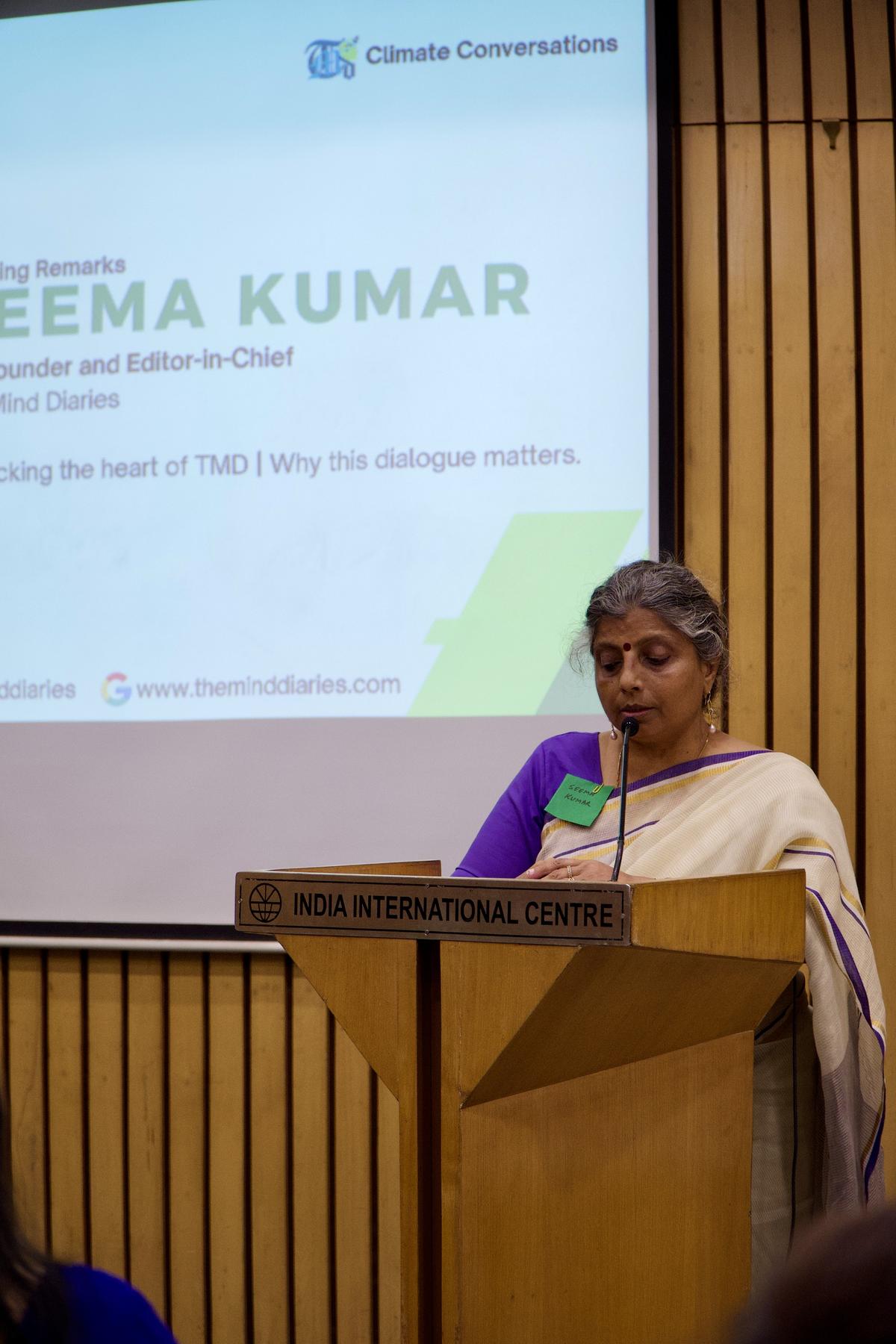Panellists at a discussion on Climate Conversations: Understanding Anxiety and Actions in Delhi
| Photo Credit: SPECIAL ARRANGEMENT
Panellists at a seminar on Climate conversations: Understanding Anxiety and Action, focussed on the deep intersection between climate change and mental health, and how media and the art of storytelling could play a role in raising awareness and mitigating the issue.
The discussions on Friday were organised by The Mind Diaries in collaboration with The Climate Reality Project.
“Climate change is impacting the psychological landscape” said Seema Kumar, co-founder and editor-in-chief of The Mind Diaries. She talked about the healing effect of creative art and storytelling, in the context of engaging mental health and how collective community effort could bring about an impactful change in conversations on the subject.
Aditya Pundir, Director (India and South Asia) The Climate Reality Project, drew the attention to climate change severely impacting agriculture, damaging infrastructure and causing water crisis. He highlighted health concerns particularly with rise in Dengue and Malaria cases. “There are two types of people who experience mental health issues surrounding the climate: those who read up on the climate crises,and develop an anxiety surrounding climate change, and those who have actually lived through such crises, and have to deal with the trauma caused by it,” he said.
According to Sandhya Choudhary from Vidyasagar Institute of Mental Health, Neuro & Allied Sciences, Delhi, a quarter of people who seek therapy at the Institute belong to 14 years to 30 years age group with eco-anxiety. “It is a rational response to an irrational world, which often develops a sense of helplessness. There is was a rhythm to life but when climate change causes inconvenient shifts in seasons, healing begins by talking about it,” she said.
On how media plays a role in driving narratives surrounding climate change, environment journalist Nidhi Jamwal said there was a need for reporters to create solution-centric stories than just writing about the problems. “Media is not trained to report on mental health,” she said. “While highlighting a problem, the tone of a story should be kept positive, which is sometimes difficult to navigate,” she added.

Seema Kumar, Co-founder, The Mind Diaries
| Photo Credit:
SPECIAL ARRANGEMENT
Ms.Jamwal also rued the lack of marginalised voices when it comes to reporting on agriculture. “We need to speak in the language of people’s hearts,” added R J Neelakshi Malik and described how her radio show weaves environmental consciousness into everyday conversations. “Even for eating golgappas by the roadside, I always carry my utensil. Everybody should join Bring Your Own Bartan club,” she added.
Namrata Gupta, Consultant Clinical Psychologist at VIMHANS, pointed out how relentless climate coverage can both inform and overwhelm the public.
The discussions were followed by a session, Together We Can, that focussed on the small, hopeful acts to navigate the emotional trauma climate change can leave.
Author and nutritionist,Kavita Devgan’s talk bridged the connection between what we eat and how we feel about the world. “Mindful eating is a form of climate action,” she stressed.
Mridul Batra, Principal of Prakriti School, Noida, echoed the importance of embedding environmental consciousness into the fabric of school culture.
The final session- Healing through Art, invited the audience into a more intimate, introspective space. It was less about data, more about depth in a world emotionally bruised by climate anxiety.
Sonia Bhandari, art therapist and parenting coach, shared powerful anecdotes from her practice which included children painting forests they feared losing, making goodies out of recycled materials and adults sketching their anxieties to something they could finally see. “Expression is the first step to healing,” she reminded.
Rounak Khare and Adeeba Jamal
Published – April 19, 2025 03:47 pm IST







